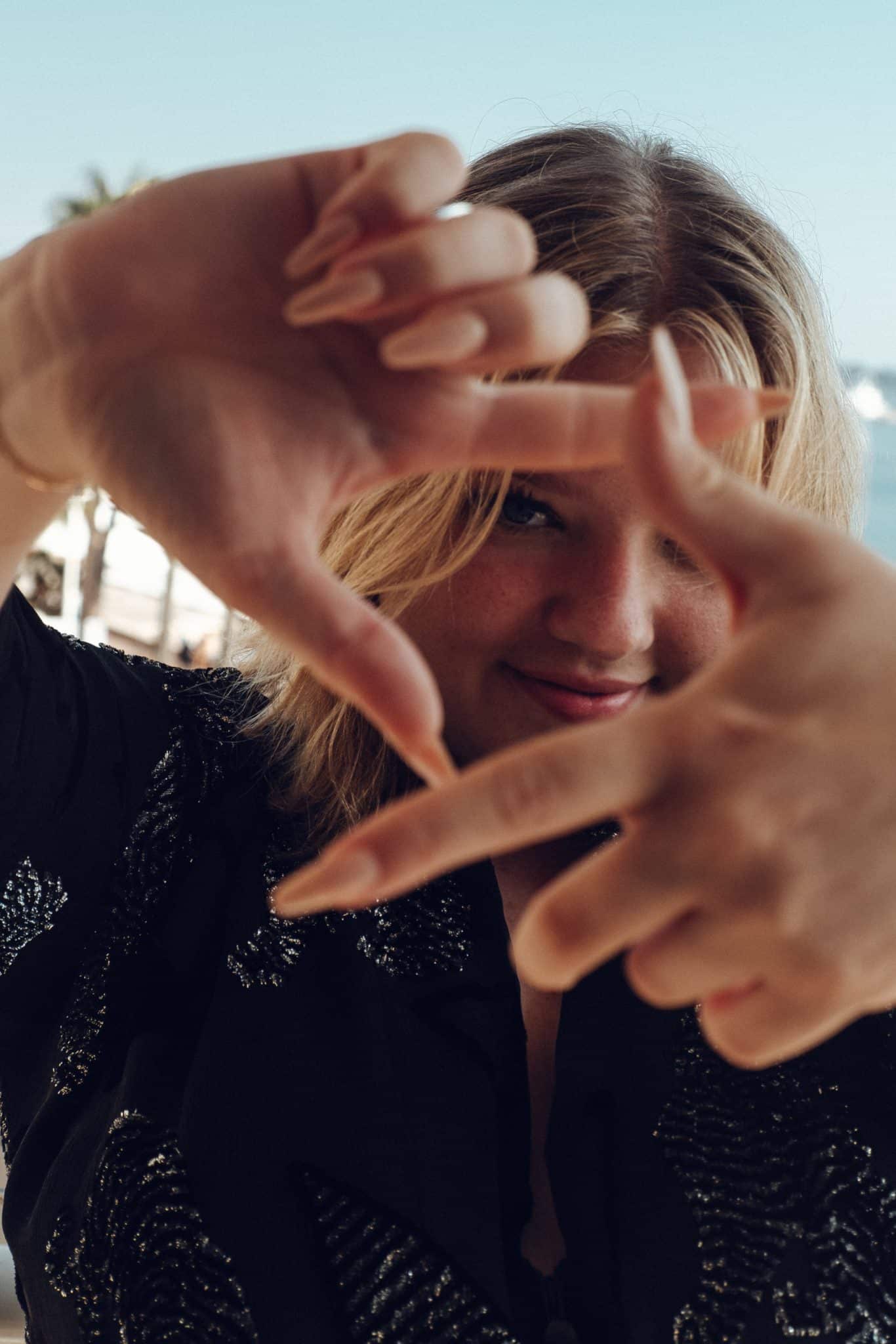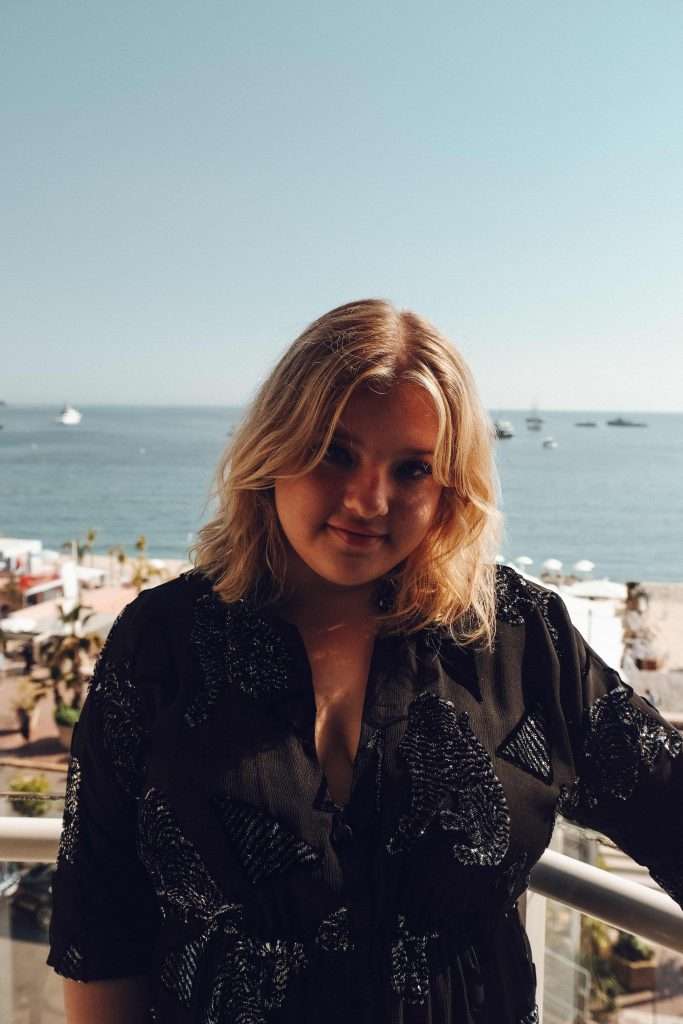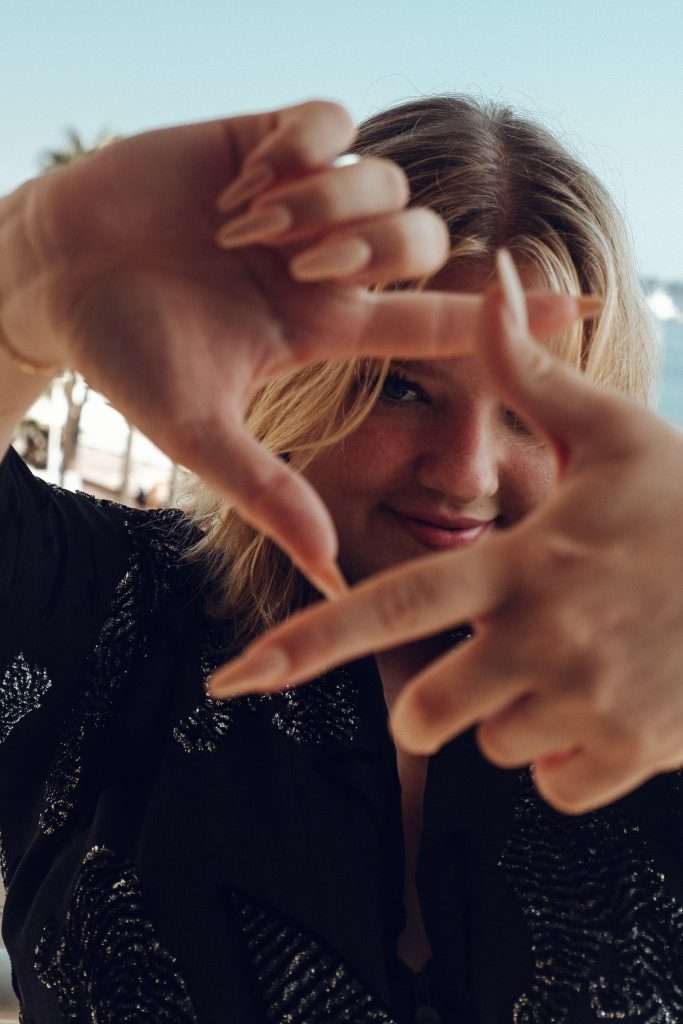
There are two Scorseses presenting their films at Cannes this year.
You might be fully aware of one of them: first name Martin…maybe you’ve seen Taxi Driver, Goodfellas, or have been fortunate enough to watch his new magnum-opus Killers of the Flower Moon? Yeah, him.
But there’s his daughter Francesca, a talented filmmaker in her own right, who is set to debut her short Fish out of Water at Cannes, just a few days after the Killers premiere. “My dad is my best friend,” she explains, when A Rabbit’s Foot met her at the buzzy Marriott on the Croisette, “but I wanted to do this myself. Obviously, he tried to gently instruct me on how to edit certain scenes, but I had to remind him, ‘Dad, this is my film!’” she laughs.
Not many would refuse the guidance of arguably the greatest director of all time, but Fish out of Water is a deeply personal work for Francesca; a cathartic tribute to her mother, and a tight and emotive judge of her own intuition as an artist. Our conversation is also peppered with the same references to cinema that her father is so well-known for—from Hitchcock to obscure gems like The Bad Seed, and she talks nostalgically about her unconventional youth spent between film sets and school. This conversation sets the scene on the first chapter of Francesca Scorsese’s career: an emerging director, the scion of a true master, and a genuine talent who has something to say, that she—and she alone—is able to articulate through the screen.

How does it feel bringing your debut to Cannes around the same time as your father’s new film? That must feel particularly special.
We were just preparing for my dad’s film to be here, and I submitted Fish out of Water thinking it wasn’t going to happen. But it found a place in the Short Film Corner and I couldn’t believe it. It’s a dream come true. I mean, I’ve always come to Cannes for his films and now he’s here attending mine. So it feels full-circle.
Being your debut film, you’ve had time to reflect on it now. How has the way you first approached the project changed in retrospect? Did you see it as a sort of learning experience?
Totally. I thought, ‘I’m here to learn and figure this out’. The first cut was forty-minutes, and we had to cut it down to fit the criteria, but I agreed. I had to cut a few scenes I was in love with, and it was heartbreaking, but we kept coming back and watching the result and it became a new challenge: ‘How do we make these moments make sense without using particular scenes?’ The sex scene in the opening was not scripted, but we wanted to give some context to the part where she receives drugs. So we just used an insert we had and put ADR over it, and did some sound mixing, and there was the context we needed! So it was certainly a major learning curve in how to address these obstacles in post-production.
Do you think your approach to filmmaking is driven by impulse and improvisation or a lot of planning?
Planning is important, but impulse is where the magic is. On some occasions, we tried to ask the actors to try new ways of behaving in a scene and it would offer a whole new element. This is a dark film, so where I could, I sought some light comedy through unscripted moments. But these were happy accidents, and those became the scenes I really loved.
The film is dedicated to your mother. If you don’t mind me asking, was there something you were trying to come to terms with through this story?
I’ve always dealt with trauma by making art. It’s the only way I can find a release. If I feel anxious or upset, I’ll start painting. My mom has been sick for like my whole life. She had early onset Parksinsons in her thirties, and now she’s in her mid-seventies. But she’s one of the strongest women I know. Over the past few years, it’s just gotten worse, and my dad and I have had to lean on each other more, because it isn’t easy to deal with. It’s hard when she doesn’t recognise you. That’s always on my mind, and I decided I wanted to tell a story about it. I wanted the maternal presence there—and so the story is based around the daughter and the mother in a way that resonates with me. Obviously, the father figure is very different from my own.
He must be proud. What was his immediate reaction?
I showed him the script first, because my professor at NYU was unsure about what I had shown him. I told dad about the central characters, and in terms of dialogue, we had a back-and-forth together—just talking—and I would use what came from these conversations in the script. It was perfect. Of course, I changed it up a little since, and when he first saw the early cuts, he really loved it. But it still took time to get to a place I was happy with.

Did he offer any guidance to you on this film?
Mostly with the script—because I felt really torn down by some of the feedback from my professor. He became my constructive sounding board. When we started editing, I would constantly show him cuts and he’d start getting picky, and I had to say ‘No!’ [laughs] but he was very proud of me. He suggested I show it to my mother, but that I also give her a little time. We were always trying to figure out when it would be best, as we didn’t want to hurt her—it’s a sensitive topic.
You grew up in a creative environment. Did you always feel destined to become a filmmaker?
It was a given. I looked at my father and thought, ‘I’m gonna do what he does!’ I’ve made little films since I was eight; home videos that my dad would create with me growing up. I literally have the first time I held a camera on footage. I was three! He asked me to take the camera off him and you can hear me breathing heavily and aiming up, and he says, ‘OK shoot me!’ and I was holding it there really shaky, and he’s standing there proud.
Do you remember being on set with your dad?
It’s an unusual childhood because you’re in two worlds: school and then on these film sets designed around different periods. I remember being in The Aviator, The Departed…he would throw me in the background. They put me in a prop plane for The Aviator, and the thing started shaking, and I’m sure I’m terrified of flying because of that moment. But it was so much fun to experience stuff like that. I have a photo of me as a child, and my dad told me the story around it: I’m holding up a stick and handing it to him. He made the set look like a total disaster—debris everywhere—and my immediate response on set was to clean up! My dad was telling me to stop [laughs]. I mean, I feel like my set memories and real-life memories are blurred together. I feel so lucky to experience that.
What do you feel defines your generation of emerging filmmakers?
I think people are becoming bolder, less afraid to tell the stories they want to tell, and show the experiences they want to show. And I think the audience wants that shock element…I mean, I know I do. With my film, I wanted to make people feel uncomfortable immediately. The main character’s role is so mean. On another note, I’m a little worried about the theatre experience, because of TV and streaming. Being in the theatre is the most magical thing. But then you can also make a film with your iPhone now, and that’s incredible. It’s easier to create now.
Are there any plans for a full-length feature?
I’ve been thinking about making Fish out of Water into a feature, and I’ve definitely been brainstorming it. But I don’t know where it’s gonna go. I want to explore what happened to her and the father of her child, maybe go back into her childhood a little. But it’s all just ideas for now. As for an adaptation or a remake? This is random but The Bad Seed (1956). I fucking love that film. I love seeing children on-screen—they have so much innocence—but it’s a facade. The films I’ve wanted to make include young people, so for a Fish out of Water feature, I’d like to make the child character more of a focal point.
Finally, what are the pressures that come with the Scorsese name?
I’m beyond honoured to be tied to that name. He’s the most incredible filmmaker, but also a human being. I can’t escape his name, because I literally have it. But when it comes to making my own things, it comes to what I feel is best for me. Kids always want to follow in their loved ones’ footsteps. If your parents are doctors, you want to be a doctor. Know what I mean? If you’re surrounded by something your whole life, you’re drawn to it. Filmmaking has always been a part of my life. Now I’ve made my own film, and it’s doing well, and I’m looking forward to seeing where it goes. It’s having its true global premier at Tribeca, and I’m honoured, and I have the most amazing people by my side. My dad is my best friend and confidant, and the only person I can be myself around.
But I am carving my own path.






